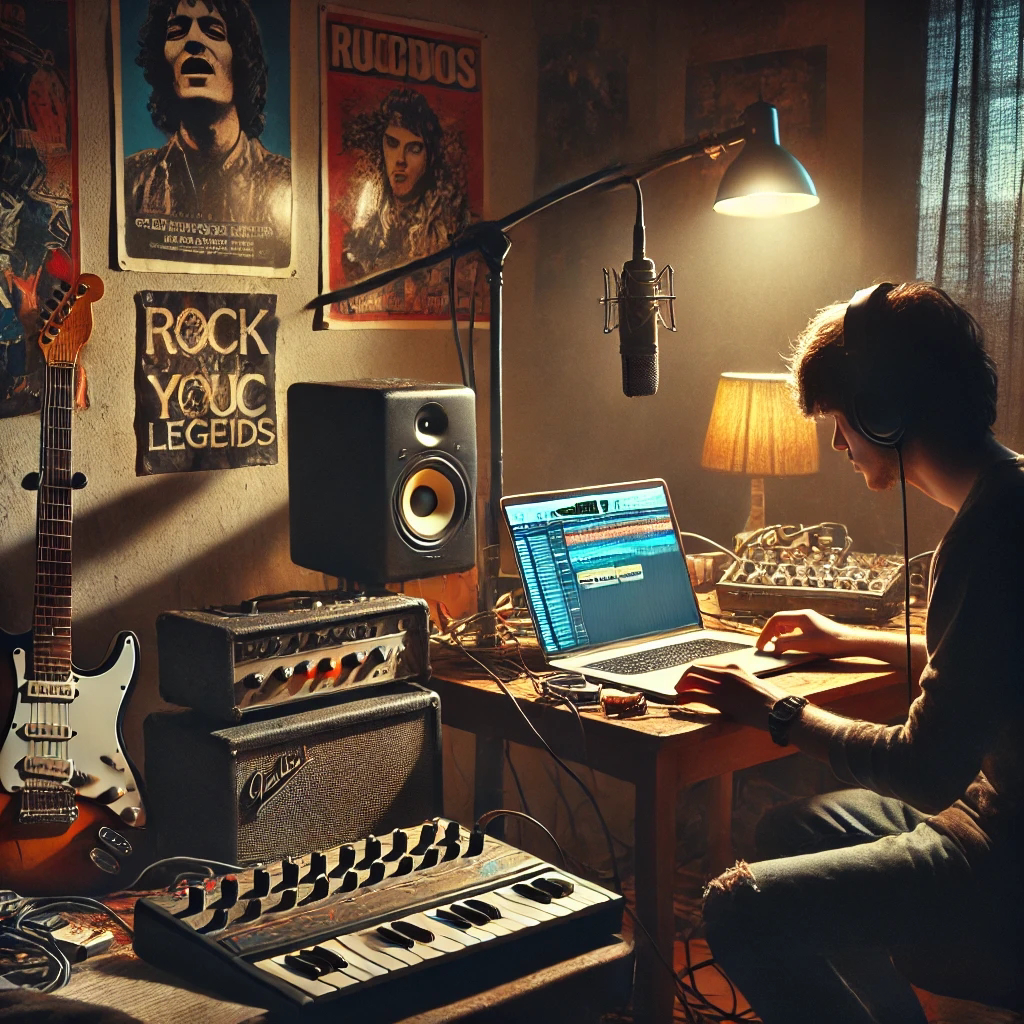In the dim glow of a secondhand MacBook screen, a teenager presses “record” in GarageBand. The beat kicks in—a mechanical loop from a borrowed drum machine, relentless in its artificiality. A cheap guitar, slightly out of tune, scrapes against the void. The vocals, captured by a USB mic purchased with a summer job’s wages, are raw and immediate, unfiltered by the polish of industry expectation. In this moment, the artist exists in what Sartre would call radical freedom.
To make rock and roll in a bedroom or a basement, armed only with a digital 8-track and the certainty that no one is waiting to hear it, is to confront the absurdity of artistic existence. There is no label to approve the mix, no producer to polish the sound. There is only the self, staring into the blank canvas of a DAW, a digital abyss from which meaning must be created.
Condemned to Be Free (and Lo-Fi)
Traditional recording studios offer structure, hierarchy, and expertise—yet they also impose constraints, financial and aesthetic. The artist in a basement, however, operates in pure anarchy, unmoored from the industry’s expectations. A riff recorded through a $20 interface takes on an almost ontological weight; it is because the artist has willed it into being.
But with this freedom comes the burden of absolute responsibility. The home-recording musician cannot blame a producer for a weak mix, cannot hide behind the high gloss of professional mastering. Every missed note, every out-of-sync overdub, every poorly compressed vocal is a direct manifestation of their choices. As Sartre writes, “Man is nothing else but what he makes of himself.” The same applies to a garage-rock album tracked on a laptop in a bedroom lit by Christmas lights.
The Bad Faith of the Algorithm
If a rock album is recorded and uploaded to Bandcamp but no one listens, does it make a sound? The modern musician, unlike the garage rockers of the 1960s, must contend with the infinite void of digital distribution. The internet offers freedom, but at the cost of obscurity. The algorithm does not care about authenticity—it thrives on predictability, engagement, optimization.
To chase trends in the hope of visibility is to live in bad faith, denying one’s own artistic instincts in favor of external validation. True freedom is found in embracing irrelevance—not as a curse, but as a condition of existential purity. The music made in isolation, with no expectation of reward, is perhaps the most honest music of all.
Rock and Roll as Existence Preceding Essence
The essence of a band used to be dictated by the machinery of the industry—by A&R reps, by radio play, by the physical limitations of vinyl or tape. Today, a band can exist before it is even heard. The music is real the moment it is recorded, regardless of its audience.
In this way, DIY recording is an act of defiance against an industry that once dictated the terms of legitimacy. The bedroom musician does not need permission to create. They do not need a scene, a manager, or a label. They need only a guitar, a beat, and a willingness to stare into the void of an empty Logic Pro session and say: I will this into existence.
Conclusion: No Exit, Just a Four-Track Loop
The bedroom studio is both a prison and a frontier. There are no gatekeepers, but there is also no guarantee of an exit. One can spend eternity tweaking EQ settings on a song no one will hear, or one can accept that the process—the distorted guitar, the programmed drums, the self-harmonized chorus—is the point.
Like Sartre’s café waiter who performs his role with too much precision, the musician must recognize when they are merely playing rock star and when they are actually being one. The difference is intent, authenticity, and the ability to embrace the absurdity of it all.
Because in the end, rock and roll is not about success. It is not about virality. It is about existence, and the existential joy of turning noise into meaning.

No comments:
Post a Comment